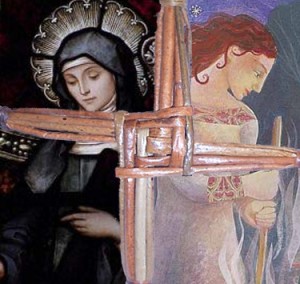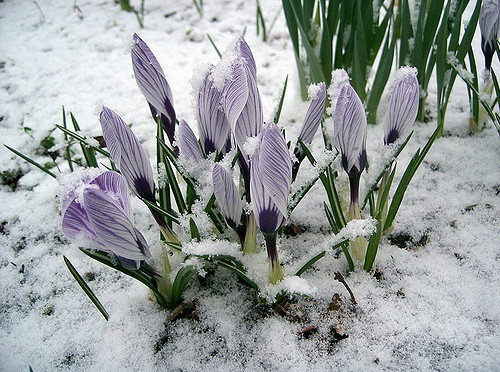TWH – The time has once again come for many modern Pagans and polytheists to celebrate the fire festival of Imbolc, sacred to the goddess Brigid, patroness of poets, healers, and smiths. The modern celebration is often held on Feb. 1 or Feb. 2. However, due to work schedules and other practical considerations, rituals and other group events can also be found throughout the week and weekend.
Similarly, Feb. 1 marked the feast day of Saint Brigid of Ireland, the patron saint of poets, dairymaids, blacksmiths, healers, cattle, fugitives, Irish nuns, midwives, and newborn babies. In Kildare, Ireland’s town square, a perpetual flame is kept lit and housed in a statue that pays homage to Brigid. Festivities for La Feile Bride in Kildare started on Jan. 29 and will continue through Feb. 5. The center that hosts the event is now celebrating its 25th year.

Brigid: saint and goddess
There are many other notable observances held during these first few days of February. For example, in some Celtic recon traditions, this is a time to honor Cú Chulainn’s three-day combat with his foster brother Fer Diad. According to the chronology in the Táin Bó Cúailnge, the epic battle happened during these dark mid-winter days. In the Urglaawe Heathen tradition, Feb. 2 marks the beginning of the twelve-day observance of Entschtanning (the emergence). It is a time to clean out hearths and honor feminine spirits and female ancestors.
Additionally, the Shinto Festival of Setsubun is held on Feb. 3. This holiday is more commonly known as the Japanese bean-throwing festival. Around Japan and the world, people visit their local Buddhist or Shinto temples to toss soy beans in order to drive away the evil spirits of winter. Setsubun is translated as “seasonal division” and is considered to be the final day of winter on the Shinto calendar.
This seasonal theme is carried through in many secular and modern religious observances, such as EarthSpirit Community’s Feast of Lights and, of course, Groundhog Day.
In the Southern Hemisphere, modern Pagans are beginning their harvest season, celebrating Lammas, Lughnasadh and other similar festivals. Autumn will soon be at their doorstep.
Over the past week, several Imbolc-inspired articles were published in mainstream media. The Irish News shared a story on the Derry Imbolc festival and traditional Irish Music. Silver City Sun News published an article about an multi-faith event held Wednesday specifically honoring the spirit of Imbolc as a celebration of world peace and the divine feminine. Seattle Weekly offered, “Imbolc and the Quickening of Spring.” World Religion News shared, “How Pagans celebrate the coming spring.”

[Photo Credit: Philip Chapman-Bell / Flickr]
“Known as Imbolc or Candlemas, the 1st of February is one of the four great festivals of the Celtic year. It marked the end of winter and the beginning of spring. At this time the first signs of spring are appearing in nature – buds are beginning to appear on trees, animals are waking up from hibernation and early spring flowers like snowdrops and daffodils are beginning to bloom [… ] The sun is getting stronger and the days are noticeably longer. It is time to celebrate the awakening and rebirth of the earth, as well as new beginnings in our own lives.” – Matty from Imbolc 2017
“Imbolc in dark, cold winter can signify endurance in the face of adversity and scarcity: we may encounter fragility, tenuousness, uncertainty, darkness and despair beyond what we think we can endure. Women know these experiences. We have held both new life and death in our hands. We have wondered: will this child make it, will the addict live or die, will my lover come home, will I survive this loss? Will I be OK? Will there be enough resources to see us into spring?” – Kim Duckett from Imbolc: Gathering Our Strength
“Imbolc tends to be a very busy holiday for me each year. Brighid is one of the deities whom I honor, and for the last few years I’ve made it a point to do something special and public at Imbolc as a way of honoring her and giving people the opportunity to connect with her. Last year, for instance, I organized a ritual service for my UU congregation based on traditional Imbolc/St. Brigid’s Eve practices from Ireland’s northern counties. With Imbolc fast approaching, now is a good time to examine the roots of Imbolc from a Gaelic standpoint. And there’s a lot for us to look at and consider: What is Imbolc all about? What exactly are “traditional” Imbolc practices? And what does any of this have to do with Brighid?” – D.C. McBride from The Birth of Fire – A History of Imbolc Traditions
“Impulse! That is the term that Imbolc now symbolizes for me, this is a time for impulse and intuition and following the lead of our bodies wisdom. […] I do not need to know exactly what it is that I’ve been growing and germinating during the hibernation season, I do not need to know what it is that will be birthed, this is still the season of mystery. I just need to be with the awakening, with the impulses, listening for messages from within my wise womb space and then waiting to see what will come. Imbolc is the moment of pause, the deep breathe before one’s whole world changes, there is no way to fully know what is to come and the deeper we allow the mystery to be, the more open we are to the endless possibilities of what life can look like after we birth into the spring season, the greater a chance for the creator to fully express her intention here on Earth through each one of us.” – Candise from The Shattering of Imbolc
“As Pagans, we honor our warrior goddesses, and we can remind ourselves that over time Brigantia became fused with wise Minerva. To ride safely through the changes to come, we must hold true to ideals and values in the face of all that would pressurize against them. We must honour science, history, and fact. We must become politically active to influence those in power to exercise their responsibilities wisely and well. We must support and find strength and inspiration from one another, bonding ever closer as the upheavals come. Sometimes bad changes can bring new light and dawning, as we realize the value of what is all too easily lost. Let the light of strength and wisdom shine in the darkness on Brigid, Bride, Brigantia’s day.” – Vivianne Crowley from Light in the Darkness on Brigantia’s Day
The Wild Hunt is not responsible for links to external content.
To join a conversation on this post:
Visit our The Wild Hunt subreddit! Point your favorite browser to https://www.reddit.com/r/The_Wild_Hunt_News/, then click “JOIN”. Make sure to click the bell, too, to be notified of new articles posted to our subreddit.
For those of you who are of Baltic or Slavic descent, I wish you good fortune on this Grabncios (Lithuanian, sorry can’t do special characters on Discus); Gromniczy (Polish) or Hramnitsy (Belorussian)!